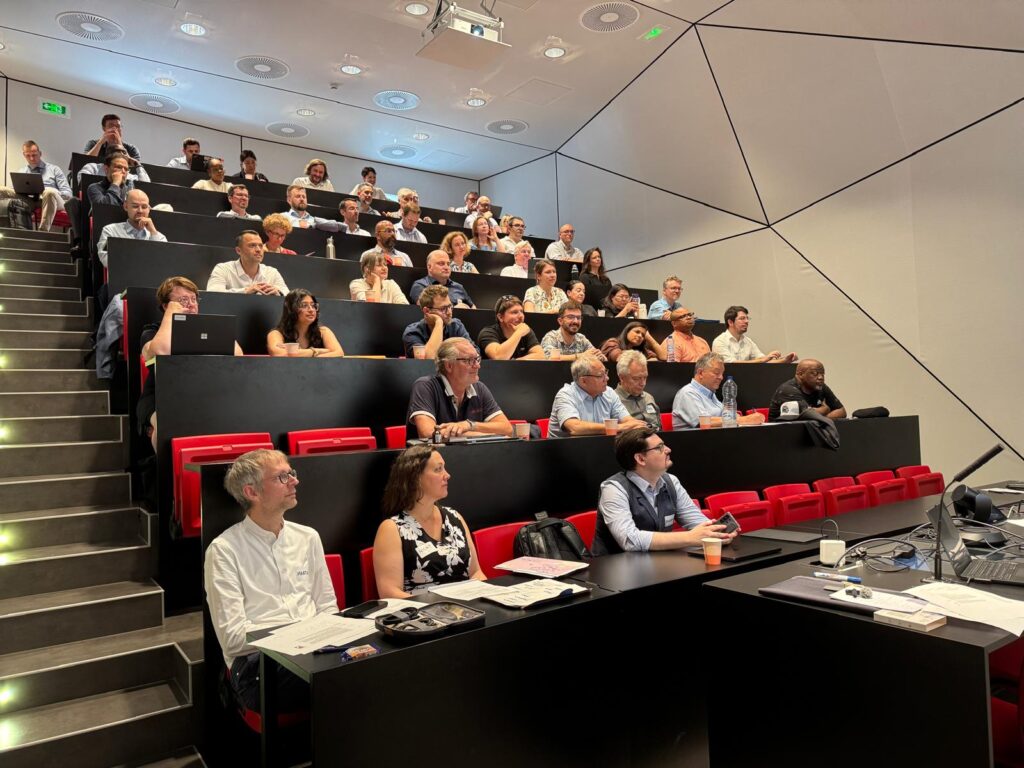The I3PM International Conference 2025: Navigating IP in the Digital Transformation – A Recap
The first international conference of the International Institute for IP Management (I3PM), held on Monday, June 23, 2025, at the CEIPI (Centre d’Études Internationales de la Propriété Intellectuelle), University of Strasbourg, marked a pivotal moment for intellectual property professionals. Under the overarching theme “IP in the Digital Transformation,” the one-day event brought together leading experts from industry and private practice to dissect the intricate relationship between intellectual property and the accelerating digital revolution.
This conference was more than just a gathering; it was a deep dive into the strategic and operational challenges and opportunities presented by the digital age for IP management experts. With its dual-track approach – one dedicated to technical IP skills and the other to the essential soft skills for IP experts – I3PM demonstrated a holistic understanding of what it takes to thrive in the contemporary IP landscape. The event aimed to not only impart critical knowledge but also to foster a community of forward-thinking IP managers equipped to guide their organizations and clients through rapid technological shifts.
The Digital Transformation: A New Frontier for IP
The central theme, “IP in the Digital Transformation,” underscored the pervasive impact of digital technologies on every facet of business and, by extension, on intellectual property. From artificial intelligence and big data to cloud computing and the Internet of Things, these advancements are not merely tools; they are reshaping business models, creating new forms of innovation, and presenting unprecedented challenges for IP protection and enforcement. The conference aimed to address how IP professionals can not only keep pace but also proactively leverage IP as a strategic asset in this evolving environment.
Also, soft skills have emerged as an indispensable complement to technical expertise for IP experts navigating the digital transformation. While a deep understanding of patent law, trademarks, and copyright remains foundational, the accelerating pace of technological change and the pervasive integration of digital elements across business functions demand much more than just legal acumen. IP professionals must now act as strategic advisors, effectively communicating complex legal concepts to non-IP stakeholders, influencing decision-makers to invest in IP strategies, and fostering an IP-aware culture throughout the organization. This requires strong negotiation abilities, persuasive communication, cross-functional collaboration, and the capacity to translate legal intricacies into tangible business value, thereby ensuring that IP strategies are not only legally sound but also strategically aligned with the company’s digital objectives and overall growth.
Furthermore, online marketing for IP experts involves more than just advertising legal services; it’s about effectively communicating the strategic value of intellectual property to potential clients, who often aren’t IP savvy. This means creating accessible content (e.g., blog posts, webinars, guides) that simplifies complex IP concepts, leveraging digital channels like LinkedIn for thought leadership, and building strong referral networks. Ultimately, successful digital marketing for IP professionals focuses on demonstrating how intellectual property can drive business growth, mitigate IP risks, and provide a competitive advantage for companies and innovators.
Karin Nordström Dyvelkov’s Keynote: Charting the Course for the Digital IP Transformation
Dr. Karin Nordström Dyvelkov, Head of IP Management at GEA Group, delivered the crucial introductory keynote at the I3PM International Conference 2025, setting the stage for the day’s in-depth discussions. Her address served as a foundational overview, characterizing the digital transformation from a practical, industry-insider perspective and highlighting its profound implications for intellectual property. As the conference then branched into its technical and soft skills tracks, her insights as a seasoned IP leader in a major industrial group have provided a vital anchor, emphasizing the real-world challenges and strategic imperatives for IP professionals navigating this rapidly evolving landscape. Her experience, particularly in managing a global IP team and protecting a wide range of intellectual assets, has lent significant weight to her opening remarks, framing the urgent need for the specialized knowledge and soft skills that the conference aimed to impart.
The IP Hard Track: Technical Insights for a Digital World
The “IP hard track” was designed to tackle the most pressing technical IP questions arising from the digital transformation. This track was a rich source of practical insights for IP practitioners grappling with the legal complexities of digital innovation.
IP Strategy in the Digital Age: The session by Dr. Benjamin Delsol, CEO at DELSOL, on IP strategy, was particularly pertinent. In an era of rapid technological convergence and disruption, a static IP strategy is a failing one. Delsol elaborated on how companies need to develop agile IP strategies that are tightly integrated with their overall digital transformation roadmap. This involves anticipating emerging technologies, understanding the IP implications of new data flows, and aligning IP protection mechanisms with evolving business objectives, such as open innovation or strategic collaborations. The emphasis was on proactive planning and flexibility rather than reactive measures.
AI-Output: Copyrightability and Patentability: A highly anticipated topic was “AI-output – When can it be copyrightable and patentable,” presented by Ines Duhanic, Data Protection Officer at MENARINI Group. As AI systems generate increasingly sophisticated content and inventions, the traditional notions of authorship and inventorship are being challenged. Duhanic explored the nuances of how existing copyright and patent laws apply to AI-generated works, the role of human interventors, and the legal implications for ownership and licensing. This session was crucial for understanding the cutting edge of IP law in relation to generative AI.
App Icon Protection: Maria Boicova-Wynants, Founding Partner at Wynants & Co, looked at the specifics of “App icon protection”. While seemingly niche, app icons are often the first visual touchpoint for a digital product and play a significant role in brand recognition and user engagement. This session covered the interplay of trademark, copyright, and design rights in safeguarding these seemingly small but strategically important assets, and the challenges of enforcement in global app stores.
Risk and Uncertainty in IP Management: Dr. Shu-Pei Oei, Global Head of IP at PALFINGER AG, addressed the critical topic of “Risk and uncertainty”. In the digital age, IP portfolios are exposed to new and amplified risks, from cyber infringement to rapidly shifting technological landscapes and evolving regulatory frameworks. Oei’s insights focused on robust risk management frameworks for IP, including identifying potential threats, assessing their impact, and implementing mitigation strategies. This included discussions on cybersecurity, data governance, and proactive monitoring of competitive IP landscapes.
Serious Game on Open Innovation: A unique and engaging element was the “serious game about open innovation,” presented by Maier Fenster, Head of Medical Devices Department at Ehrlich Group, and Magnus Hakvåg, CEO at House of Knowledge. Open innovation, the collaborative use of external and internal ideas to drive innovation, is a hallmark of the digital economy. The serious game format provided participants with a hands-on, interactive way to explore IP challenges and best practices in open innovation scenarios, such as structuring licensing agreements, managing joint ownership, and safeguarding trade secrets in collaborative environments.
The IP Soft Track: Essential Skills for the Modern IP Expert
Recognizing that technical expertise alone is insufficient for success, the “IP soft track” focused on the crucial interpersonal and strategic skills IP experts need to excel in the digital transformation. This track highlighted the shift from a purely legalistic view of IP to a more business-centric role.
The IP Mindset Shift and Influencing Decision-Makers: Maria Boicova-Wynants also contributed to the soft track with a session on “The IP mindset shift – how to position yourself and influence decision-makers?”. This topic is vital for IP professionals who often need to advocate for IP strategies within their organizations and to their clients. Boicova-Wynants emphasized moving beyond being a legal service provider to becoming a strategic business partner, requiring skills in communication, negotiation, and translating complex IP concepts into business value propositions.
The Hot IP Pitch: Dr. Benjamin Delsol and Maier Fenster teamed up for “The hot IP pitch – turning your IP strategy into an impactful pitch for decision-makers”. This practical session equipped participants with the tools and techniques to craft compelling presentations that articulate the value of IP to non-IP executives, securing buy-in and resources for IP initiatives. It covered structuring a pitch, highlighting key benefits, and addressing potential objections from a business perspective.
Inclusive Innovation: Ines Duhanic explored “Inclusive innovation – maximizing Europe’s potential through women’s contributions”. This forward-looking topic underscores the importance of diversity and inclusion in driving innovation. Duhanic’s presentation highlighted how fostering a diverse workforce, particularly by empowering women in IP and STEM fields, can lead to more robust and varied intellectual property generation, ultimately benefiting economic growth and societal progress.
Soft Skills for Company-Wide IP: Dr. Shu-Pei Oei continued her contributions in the soft track with “Soft skills for company-wide IP – building from the ground up”. This session addressed the challenges of embedding IP awareness and best practices across an entire organization, not just within the IP or R&D departments. It covered skills like cross-functional collaboration, internal communication campaigns, training, and fostering an IP-awareness culture.
Systematic Business Development for IP Experts: Finally, Prof. Dr. Alexander Wurzer, Director of IP Management Education at CEIPI, provided insights into “Systematic business development for IP experts”. This session was crucial for IP professionals in private practice or those looking to expand their influence within an organization. It focused on how IP experts can proactively identify opportunities, cultivate client relationships (internal or external), and strategically position their expertise to drive business growth and value.
Key Takeaways and Future Outlook
The I3PM International Conference 2025, with its meticulously planned agenda, clearly aimed to equip IP professionals with both the technical knowledge and the soft skills necessary to navigate the complexities of the digital transformation. The discussions highlighted several critical takeaways:
- IP is a Strategic Imperative, Not Just a Legal Function: The digital age demands that IP be viewed as a core business asset and a driver of innovation, deeply integrated into overall corporate strategy.
- Adaptability is Key: IP practices must continuously evolve to keep pace with rapid technological advancements, requiring IP professionals to be agile and forward-thinking.
- Soft Skills are Non-Negotiable: Effective communication, influence, and business acumen are as critical as legal expertise for IP professionals to successfully get new clients, implement IP strategies and secure organizational buy-in.
- Collaboration and Open Innovation: The increasing interconnectedness of the digital world necessitates new IP management approaches for collaborations, licensing, and joint ventures.
The conference underscored I3PM’s commitment to advancing the IP management profession by providing a platform for knowledge exchange, networking, and professional development. By focusing on both the hard and soft aspects of IP in the digital transformation, the conference aimed to empower IP experts to become invaluable strategic partners within their organizations and to their clients, ensuring that intellectual property remains a strong pillar of innovation and economic growth in the digital age.
The success of this first conference shows that I3PM is a leading voice in intellectual property management, poised to continue shaping the discourse and equipping professionals for the challenges and opportunities ahead. The discussions and insights generated on June 23rd, 2025, will undoubtedly resonate throughout the IP community, inspiring new IP strategies and fostering better IP communication and awareness online.



